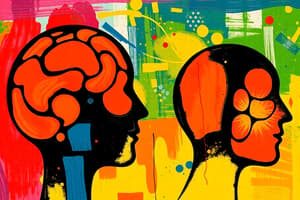Podcast
Questions and Answers
Which psychologist is associated with the principle of free association in psychoanalytic psychology?
Which psychologist is associated with the principle of free association in psychoanalytic psychology?
What is the central idea of Gestalt psychology?
What is the central idea of Gestalt psychology?
Which of these approaches to psychology focuses primarily on observable behaviors?
Which of these approaches to psychology focuses primarily on observable behaviors?
In the context of classical conditioning, what does it mean when a dog salivates at the sound of a tuning fork?
In the context of classical conditioning, what does it mean when a dog salivates at the sound of a tuning fork?
Which of the following best describes the role of a psychoanalyst?
Which of the following best describes the role of a psychoanalyst?
Who is considered the founder of modern psychology?
Who is considered the founder of modern psychology?
What method did structuralists use to observe mental experiences?
What method did structuralists use to observe mental experiences?
Which psychologist focused on the functions of consciousness rather than its structure?
Which psychologist focused on the functions of consciousness rather than its structure?
What was Sir Francis Galton primarily concerned with in his research?
What was Sir Francis Galton primarily concerned with in his research?
What significant idea did Copernicus contribute to the understanding of the universe?
What significant idea did Copernicus contribute to the understanding of the universe?
Which of the following components is NOT part of the theory proposed by scientists after recognizing flaws in Galton's research?
Which of the following components is NOT part of the theory proposed by scientists after recognizing flaws in Galton's research?
What did the Greeks contribute to the early understanding of psychology?
What did the Greeks contribute to the early understanding of psychology?
What is the key difference between structuralism and functionalism in psychology?
What is the key difference between structuralism and functionalism in psychology?
What is the primary role of reinforcement according to Skinner?
What is the primary role of reinforcement according to Skinner?
Which aspect of psychology focuses on an organism's physical processes?
Which aspect of psychology focuses on an organism's physical processes?
Which psychologists are associated with the humanistic approach to psychology?
Which psychologists are associated with the humanistic approach to psychology?
What is the primary purpose of the systematic method in psychology?
What is the primary purpose of the systematic method in psychology?
What do cognitive psychologists study?
What do cognitive psychologists study?
Which of the following best defines a hypothesis in psychology?
Which of the following best defines a hypothesis in psychology?
What is a key concern of sociocultural psychologists?
What is a key concern of sociocultural psychologists?
What is the focus of biological psychology?
What is the focus of biological psychology?
What is one of the goals of psychology related to understanding behavior?
What is one of the goals of psychology related to understanding behavior?
In the scientific method, what follows after forming a hypothesis?
In the scientific method, what follows after forming a hypothesis?
What distinguishes applied science from basic science in psychology?
What distinguishes applied science from basic science in psychology?
Which of the following is a reason psychologists predict behaviors?
Which of the following is a reason psychologists predict behaviors?
What is the first step in the scientific method employed in psychology?
What is the first step in the scientific method employed in psychology?
Flashcards are hidden until you start studying
Study Notes
Why Study Psychology?
- Psychologists study complex behavior, focusing on both physiological (organism's physical processes) and cognitive (organism's thinking and understanding) aspects.
What is Psychology?
- The scientific study of behavior tested through scientific research.
- Can involve both animal and human behaviors.
- Focuses on thoughts, feelings, and observable fantasies.
- Requires systematic methods.
Use of Systematic Methods
- Aims to understand why people think, act, and feel as they do.
- Reduces the chance of reaching false conclusions.
The Goals of Psychology
- Description: Gather information about the behavior being studied.
- Explanation: Seek to explain why people or animals behave as they do, using hypotheses (assumptions tested through research) and theories (sets of assumptions explaining phenomena).
- Prediction: Predict future behavior based on studying past behaviors.
- Influence: Seek to positively influence behavior.
- Basic Science: Pursuing knowledge about phenomena for its own sake.
- Applied Science: Using scientific findings for practical goals.
Scientific Method
- Involves a sequential process:
- Question
- Hypothesis
- Experiment
- Results
- Conclusions
- Theory
Famous Psychological Experiments
- Ivan Pavlov: Classical Conditioning (salivating dog experiment)
- B.F. Skinner: Operant Conditioning
- Stanley Milgram: Obedience
- Solomon Asch: Conformity
A Brief History of Psychology
- Origins: Greeks in the 5th and 6th centuries AD studied human behavior, proposing that people were rational and not controlled by gods. Laid the foundation for modern science.
- 1500-1600s:
- Copernicus: Published the earth was not the center of the universe, the sun was.
- Galileo Galilei: Used a telescope to confirm Copernicus’ findings.
- Descartes: Proposed a link between the body and mind.
Historical Approaches
- Structuralism:
- Wilhelm Wundt: Established modern psychology as a separate field, setting up the first psychology lab in Germany.
- Identified two types of mental elements: sensations and feelings.
- Utilized introspection (self-observation reporting thoughts and feelings).
- Functionalism:
- William James: Taught the first psychology class at Harvard and wrote the first psychology textbook.
- Focused on the function of consciousness, not just its structure.
- Inheritable Traits:
- Sir Francis Galton: Studied how heredity influences abilities, character, and behavior, focusing on genius as a hereditary trait.
- His research was later criticized for not considering environmental factors.
- Gestalt Psychology:
- Max Wertheimer, Wolfgang Kohler, Kurt Koffka: Disagreed with structuralism and behaviorism.
- Believed perception was more than the sum of its parts, studying how sensations are assembled into perceptual experiences.
Contemporary Approaches
- Psychoanalytic Psychology:
- Sigmund Freud: Focused on the unconscious mind, using free association to access it.
- Believed dreams reflected primal urges and unconscious desires.
- Utilized case studies to analyze individual experiences.
- Behavioral Psychology:
- Ivan Pavlov: Classical Conditioning (salivating dog experiment).
- John Watson: Believed psychology should only study observable behavior.
- B.F. Skinner: Introduced reinforcement (responses that increase the likelihood of behavior repetition).
- Humanistic Psychology:
- Abraham Maslow, Carl Rogers, Rollo May: Believed in human freedom and personal growth.
- Emphasized human nature as evolving and self-directed
- Cognitive Psychology:
- Jean Piaget, Noam Chomsky, Leon Festinger: Studied how information is processed, stored, retrieved, and used.
- Believed that behavior is more complex than simple stimulus-response.
- Biological Psychology (Behavioral Neuroscience):
- Psychobiologists: Studied how physical and chemical changes in the body influence behavior.
- Found a link between genetics and behaviors, and chemical changes in the brain and human behavior.
- Sociocultural Psychology:
- Studies the influence of culture and ethnicity on behavior and social functioning.
- Examines the impact of immigration on social structures.
- Focuses on attitudes, values, beliefs, social norms, and roles within diverse racial and ethnic groups.
Studying That Suits You
Use AI to generate personalized quizzes and flashcards to suit your learning preferences.




